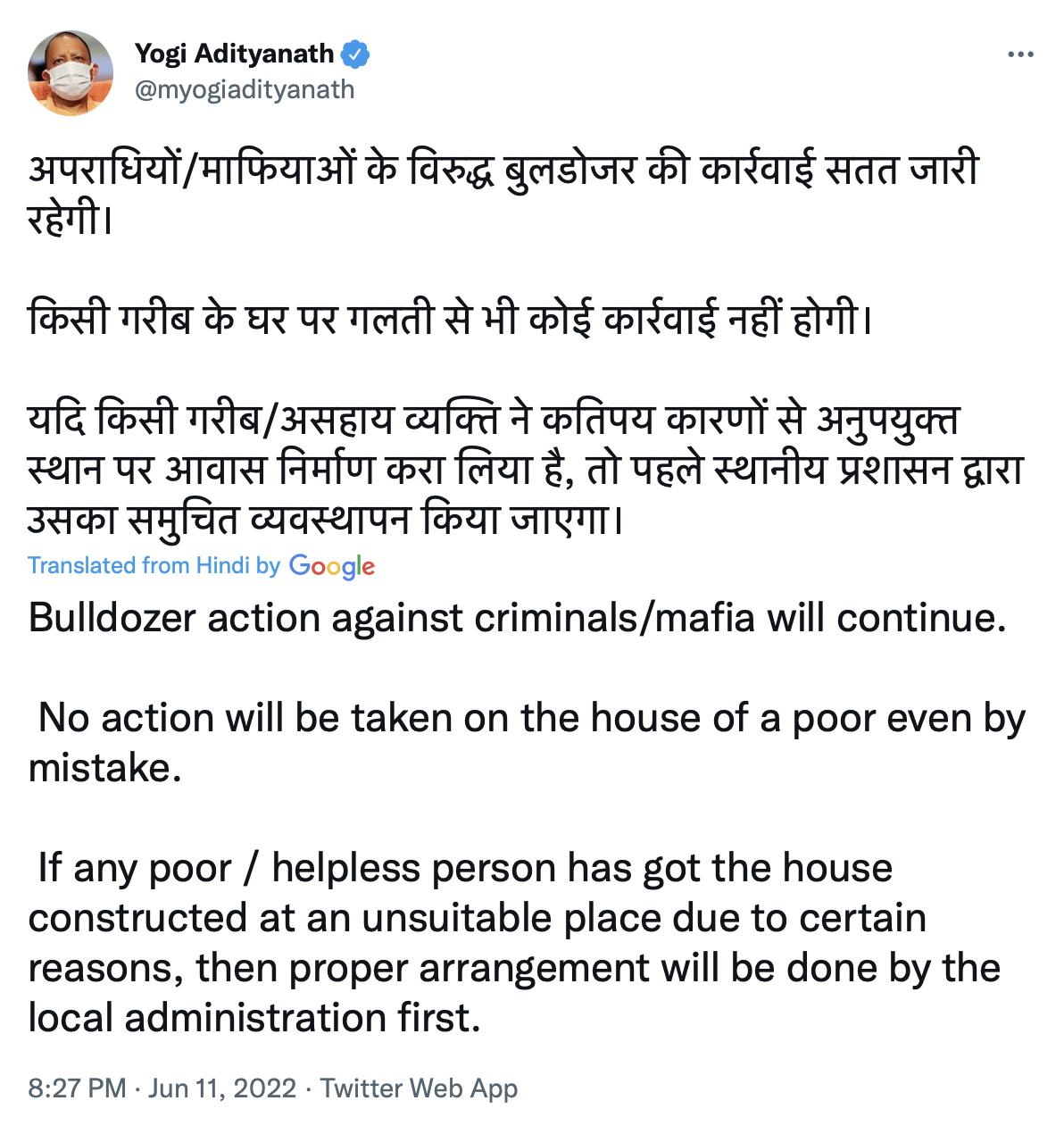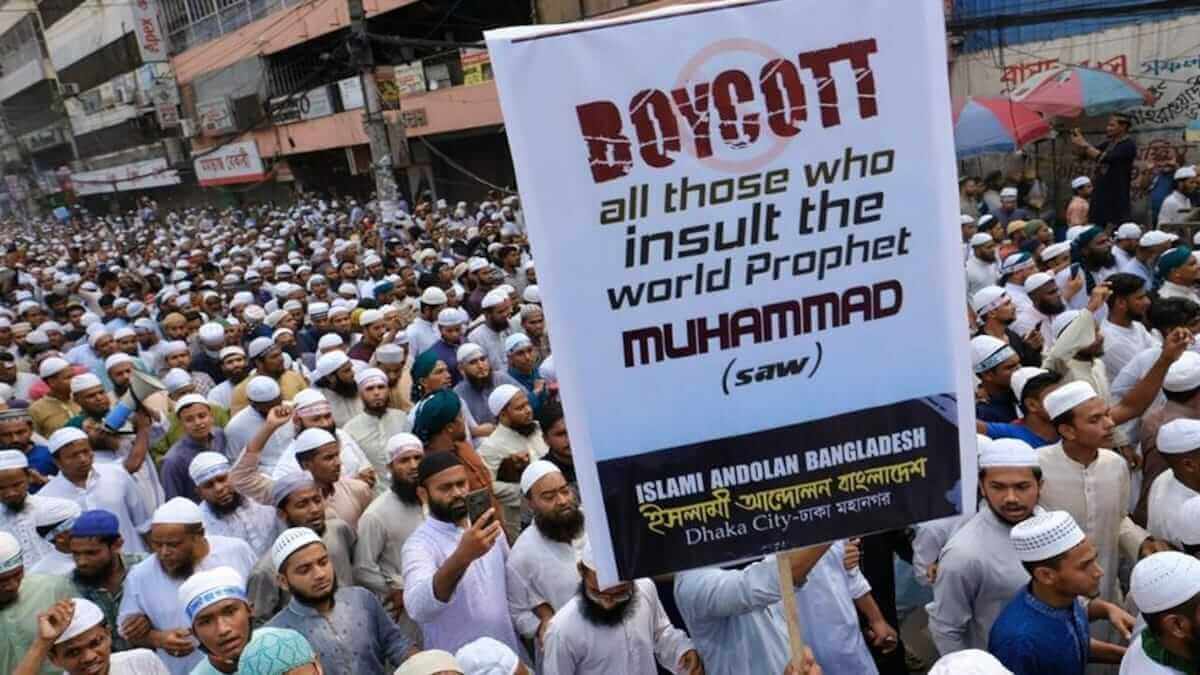Thousands of citizens across Pakistan and Bangladesh protested against controversial remarks on Prophet Muhammad by media officials from India’s ruling Bharatiya Janata Party (BJP). However, while the Pakistani government has repeatedly condemned the Indian government for “pain and anguish” caused to Muslims worldwide, Bangladesh has insisted that the matter is a primarily an external matter and downplayed public anger.
Apart from touching on the worldwide concern generated by the remarks, Pakistani Foreign Minister Bilawal Bhutto Zardari has also slammed the Indian government for its “high-handed” response to “peaceful protests” within its own borders.
In a conversation with Organisation of Islamic Cooperation (OIC) Secretary-General, Hissien Brahim Taha, he said this marks the “latest manifestation of the Indian government’s ongoing persecution of Muslims.”
"#Pakistan strongly condemns the brutal treatment by Indian authorities of Muslim who were registering a peaceful protest after Friday prayers over the derogatory remarks of the two members of the ruling political party BJP against Prophet Muhammad (PBUH).", says @ForeignOfficePk
— Anas Mallick (@AnasMallick) June 11, 2022
His comments were also echoed by other Pakistani officials, including, Prime Minister (PM) Shehbaz Sharif, who urged the National Assembly to adopt a resolution against the remarks.
Similarly, President Dr Arif Alvi criticised the Indian government’s “use of force” against Muslim protestors, noting that it had resulted in the death of two “peaceful protestors” and hundreds of arrests. He highlighted that “Hindutva groups” continue their attacks against Muslims “with complete impunity.”
💬 Pakistan’s rejection and strongest condemnation of the highly derogatory remarks by two senior officials of India’s ruling BJP party pic.twitter.com/hwaRrdlEWO
— Spokesperson 🇵🇰 MoFA (@ForeignOfficePk) June 10, 2022
Their remarks came as thousands of Pakistani cicitzens took to the streets of Islamabad and Karachi last week to demand the closure of the Indian high commission and the boycott of Indian products.
Similar protests were seen across Bangladesh on June 10. In Dhaka, for instance, thousands gathered around the Baitul Mukarram mosque, voicing their opposition to the Indian government and calling for a boycott of Indian products. Demonstrations were also seen in Savar, Narayanganj, Pabna, Manikganj, Barishal, and Khulna, as well as Teknaf, a town bordering India.
The protests were organised by hardline religious organisations such as the Jamiat Ulema Bangladesh, Khelafat Majlis, and Islam Oikyajot, which have often accused the ruling Awami League of compromising Bangladesh’s interest for India’s benefit.
Students take to the streets in Bangladesh to protest over ex- BJP spokeswoman Nupur Sharma’s slander of the Prophet Muhammad. Slogans such as “Boycott all Indian products” are being screamed by the infuriated protesters. Take a look:pic.twitter.com/gZksCNcqSL
— Steve Hanke (@steve_hanke) June 10, 2022
However, Information Minister Hasan Mahmud stressed that the BJP officials’ comments are primarily an “external issue” but stressed that the government would not compromise “on the honour of the Prophet.” He clarified, “Wherever [something] happens against the Prophet, we condemn it. But we congratulate the Government of India at the same time [for taking] legal action against those who said [something] against Prophet Mohammed.”
He went on to emphasise that India and Bangladesh have a “very good relationship” and expressed his satisfaction with the BJP’s punishments for the officials in question. Moreover, even in the face of widespread protests, he claimed that the issue did not get as much attention in Bangladesh as it did in the Middle East, Indonesia, Pakistan, or the Maldives.
Today is Friday and there are countless stone pelting incidence unfolding in India. Terror has no religion, really? pic.twitter.com/zEQ00Os5Yi
— The Poll Lady (@ThePollLady) June 10, 2022
The continued concern about the remarks against Prophet Muhammad come amid violent protests in India, with demonstrations seen in Delhi, Gujarat, Jammu and Kashmir (J&K), Uttar Pradesh, Jharkhand, West Bengal Madhya Pradesh, Karnataka, Bihar, and Maharashtra. There have been reports of stone pelting by protesters as well as excessive use of force by the police.
40 police officers were injured in UP, West Bengal, and Jharkhand. Furthermore, two protestors were shot dead in Ranchi. Over 200 people were arrested across just six UP districts; extra security forces have been deployed in Lucknow, Kanpur, and Firozabad.
Against this backdrop, internet services were blocked for 24 hours in Ranchi and Srinagar. A curfew has also been declared in Ranchi and adjoining areas, along with certain other regions in West Bengal and J&K.

UP Chief Minister Yogi Adityanath released a statement confirming that security forces have been instructed to take all necessary actions against the “anti-social elements.” He warned, “Those who take the law into their hands will be taught strict lessons.”
Apart from the arrests, the UP police has also taken to bulldozing the homes of those accused of instigating violence. In Saharanpur, Prayagraj-based political leader Mohammed Javed’s house was demolished for his role as one of the orchestrators of Friday’s violence. Similar demolitions were reported in Kanpur and Noida as well.
The arbitrary police action against Afreen Fatima’s family is violation of civil rights.
— Waris Pathan (@warispathan) June 12, 2022
UP government taking law in its own hands is Condemnable. Nupur Sharma isn't being arrested but poor people are paying price for raising voice#StandWithAfreenFatima #MuslimLivesMatter pic.twitter.com/GmuaKCZCCb
The civil unrest across South Asia was instigated after BJP spokesperson Nupur Sharma said on June 3 that certain aspects about Prophet Mohammed from the Holy Quran could be mocked. Subsequently, the ruling party’s Delhi media chief, Naveen Kumar Jindal, supported Sharma by saying that the Prophet had “married a six-year-old girl and had sex with her at nine years.” After domestic and international calls for action, the BJP suspended Sharma and expelled Jindal from the party.
So far, 17 Islamic countries—the United Arab Emirates, Qatar, Kuwait, Jordan, Oman, Saudi Arabia, Pakistan, Afghanistan, Iran, Bahrain, Indonesia, Turkey, Maldives, Libya, Malaysia, and Iraq—have condemned the BJP for the comments. The Gulf Cooperation Council (GCC), the Organization of Islamic Cooperation (OIC), and the Arab League have also voiced their stern opposition to the remarks.

